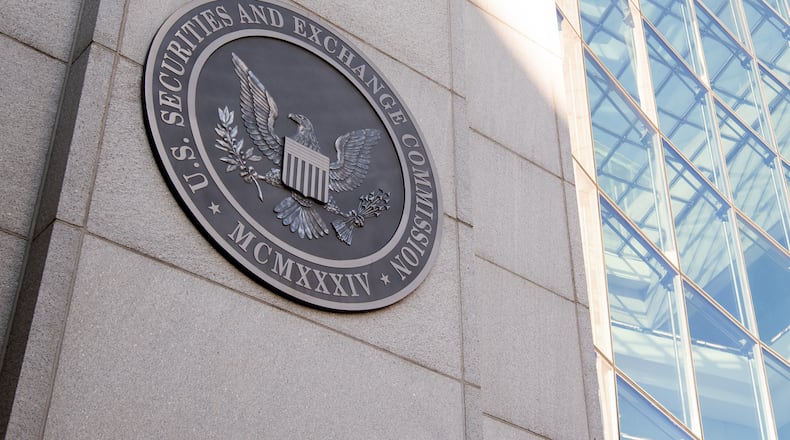A lawsuit filed by 30 North Carolina residents has accused New York-based brokerage and investment bank Oppenheimer & Co. and two of its Atlanta-based managers of hiding the truth about a massive Ponzi scheme being run by its employees.
According to a filing in Fulton County State Court, the scheme was run by John Woods, a former Marietta-based Oppenheimer securities broker who was also senior vice president in its Atlanta branch office. Woods pleaded guilty to wire fraud in March.
The 30 plaintiffs say they are among the victims of that scheme, a $120 million scam that involved putting money into Horizon Private Equity, a fund managed by Woods, and sold for a decade by Woods and other sales people.
During that time, Woods was overseen by Gordon Morse and Ann Greene, metro Atlanta residents who are named along with Oppenheimer as defendants in the suit. Morse no longer works for Oppenheimer. Greene is still with the company.
Morse did not return a call from a reporter. Through a company spokesman, Greene declined to comment.
Complaints were made in 2022 to the Financial Industry Regulatory Authority, a private group that provides industry oversight, that Greene had failed to supervise those conducting a Ponzi scheme. In response, Greene wrote: “I at all times conducted myself in an appropriate and professional manner. I deny all allegations of wrongdoing, and intend to vigorously defend myself against the false, unwarranted and unsubstantiated allegations.”
Oppenheimer & Co. is still reviewing the complaint, the spokesman said.
“But to the best of its knowledge none of the claimants are or ever have been customers of Oppenheimer,” the statement said.
Craig Kuglar, the Atlanta-based attorney who filed the action along with a group of out-of-state lawyers, did not respond to phone and email messages requesting comment.
However, the filing asserts that much of the fraud carried out by Woods was done in Oppenheimer’s office while he was under the supervision of Oppenheimer executives.
“Until recently, plaintiffs did not know, nor in the exercise of reasonable diligence could have known, of defendants’ direct involvement in and knowledge of Horizon,” the filing said. “Oppenheimer’s repeated public denial of having any knowledge of the illegal Horizon scheme, which it continues to publish to this date, was revealed to be false after other Horizon investors asserted claims against Oppenheimer and forced their executives and employees to testify under oath as to their knowledge of and involvement in Woods’s illegal scheme.”
As The Atlanta Journal-Constitution reported in 2021, Woods spent a decade persuading 400 investors in 20 states to trust him with their investments. He and his associates guaranteed up to 7% interest for two to three years in return for putting money into Horizon Private Equity.
Investors weren’t told much about how the fund worked, only that money would be put in things like government bonds or small real estate projects.
The Securities and Exchange Commission accused Woods of operating a massive Ponzi scheme: The “returns” that some investors received were actually paid from money raised from new investors, according to federal regulators.
The SEC said also said Woods solicited investments for Horizon through Southport Capital, another investment adviser firm he secretly controlled. Oppenheimer said in 2021 that it had long since stopped doing any business with Southport.
By mid-2021, Horizon owed investors more than $110 million in principal alone, the SEC said at the time.
Some of the plaintiffs in the current suit say they lost hundreds of thousands of dollars in the scheme. Among them:
Lisa Wright of Pittsboro, N.C. ,invested about $564,000 in Horizon in 2018 and 2019. She lost most or all of it, according to the filing.
Susan Gregory and her late husband, who lived in King, N.C. , invested about $453,200 of their retirement savings in Horizon. All or most of the money was lost, the filing says.
Barbara and Russell Danley of Newton, N.C., said they invested about $307,000 in Horizon in 2019 and 2020, losing most or all of it.
The plaintiffs are asking the court to compel Oppenheimer to pay unspecified damages, including “treble damages, punitive damages, and any other enhanced damages allowed by law or statute, rule or regulation arising out of defendants’ conduct.”
Last fall, Oppenheimer lost a $36.7 million arbitration case stemming from complaints by another group of investors who said they had been bilked by Woods while he was operating from Oppenheimer offices.
In January, Oppenheimer lost an attempt to vacate that decision in Georgia Superior Court.
About the Author
The Latest
Featured



